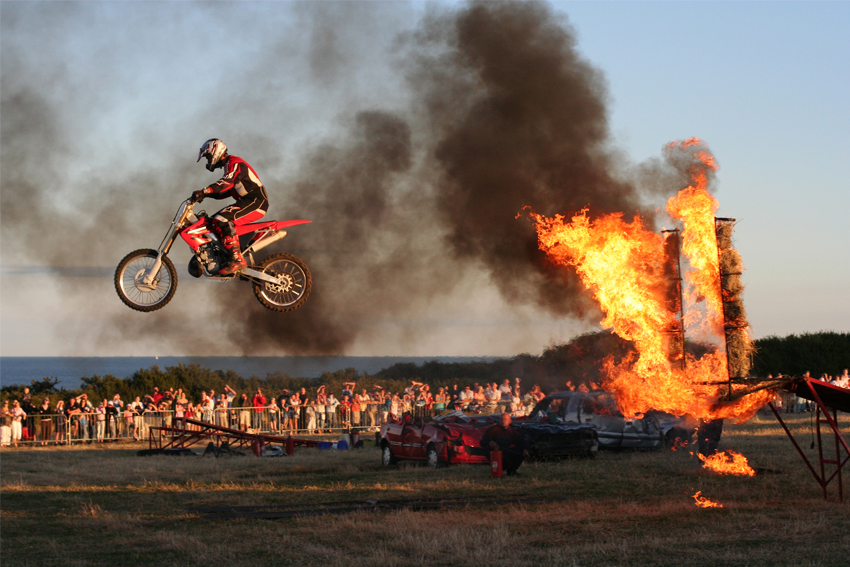Enter the danger zone

Here in the UK, unless you choose to opt out, you can’t work more than 48 hours a week on average. And, if you’re under 18, you can’t work more than 8 hours a day or 40 hours a week.
However, working too long isn’t the only hazard employees face. There are some jobs that are still perilous – in fact, nearly every industry has its share of danger. These are not for the faint of heart. If you’re looking for a new role, would you consider taking on one of the most dangerous jobs in the world?
Off the shores of the UK fishing has consistently been ranked among the most dangerous jobs – it’s one reason why TV shows such as Deadliest Catch are so popular. The most obvious dangers include sinking or falling overboard but there are records, too, of collisions, net winch malfunctions and diving misadventures.
What could be worse than water? How about adding electricity? For underwater welders this is just part of the job when diving to repair pipelines, ships’ hulls or dams’ walls.
On the UK Continental Shelf, the region of mineral-rich waters surrounding Britain, divers and welders must also contend with extreme ocean and weather conditions, when working on oil rigs. Even the oil rig workers who stay high and dry on the platform must contend with heights, heavy equipment and dangerous materials.
Next most at risk are loggers who must operate heavy cutting machinery, often in some of the most remote mountains and hillsides in Britain, where they are prone to falling trees and even the occasional landslide.
Not surprisingly, pilots and flight engineers also make the list. While commercial airline safety has greatly improved over the years, incidents such as the recent lightning strike and runway crash in Moscow, show flying can still be a risky business.
Back on terra firma, meanwhile, farmers can also come a cropper, usually not from raging bulls or stampeding horses but from accidents while working with machinery.
Sometimes, of course, a job is created and enjoyed specifically for the danger that’s involved.
The perfect example is that of a stuntperson, who is essentially paid to perform actions deemed too risky for movie actors or to directly thrill a live audience. Did you know the British Equity Stunt Register, founded in 1973, has established the highest standards of performance and safety for stunt performers?
Sign up for this line of work and you could find yourself leaping from buildings, deliberately crashing race cars or using real weapons and ammunition in staged shoot-outs.
Leaked pictures from Daniel Craig’s fifth and final James Bond film revealed stunt double Jean-Charles Rousseau Rousseau stepping into the line of fire and leaping from cars for 007. The Frenchman has also doubled up for Jason Bourne and performed stunts for Mission Impossible 6.
While you might not get to stand in for Tom Cruise, if you want to take your career to a new level, how about rising to the challenge of becoming a wind turbine engineer?
With an average height often in excess of 300 feet, this is certainly not a job if you don’t have a head for heights. Installing and maintaining the blades and gear mechanisms involves climbing, harness and rappelling skills that are the envy of experienced mountaineers.
Staying hundreds of feet off the ground for your entire working day is also work environment shared by window cleaners. From the skyscrapers of London to the tower blocks and factories of the UK’s towns and cities, washing windows on some of the nation’s tallest buildings demands nerves of steel. Could you enjoy a packed lunch on a tiny platform hung from ropes on the side of a tall building?
Perhaps, you’d feel safer feeding a tiger or washing an elephant. These are just two of the tasks that must be done by the UK’s zookeepers and animal sanctuary assistants.
And when Simba gets a toothache or sore paw it’s the role of the vet to get up close and personal with the king of the jungle and sort things out.
It also falls to a large animal vet to attend to livestock on farms – where the average dairy cow looks happy and harmless but can weigh the same as a small car, making close quarters work a tricky business.
If these jobs sound too scary to consider, there are many tried and tested health and safety rules and guidelines to help ensure calamity isn’t a daily occurrence.
There’s also one other factor to think about: more danger means more money.
If you have the derring-do to be an action hero, you can earn a significantly higher salary than settling for a cosy day job.
So, if you really want to push yourself in a role that offers adventure and adrenaline, why not look for that perfect position online now?
Posted on May 14, 2019
Topics
Recent
- <strong>How to Become an IT Professional in England: Qualifications and Skills for the Role</strong>
- How to Email Your CV: A Guide for Jobseekers in England & Wales
- Exploring Rewarding Careers in the Third Sector and Further Education in England
- Setting up your first LinkedIn profile
- Dealing with the ‘Summer Scaries’
- Unlocking Career Success: How to Make the Most of Jobs24
- Common questions asked in an interview and how to answer them
- Questions to Ask at the end of an Interview
